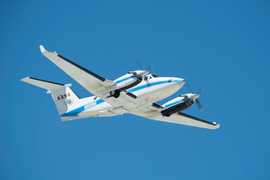
Korea-United States Ocean Color Study
Atmospheric Composition, Carbon Cycle & Ecosystems
- 1
- Deployment
2016-05-20 2016-06-06 - 3
- Platforms
- 5
- Data Products
The Campaign
The Korea-United States Ocean Color Study (KORUS-OC) was a joint effort between NASA and the Korea Institute of Ocean Science and Technology (KIOST) to study phytoplankton and its influence on atmospheric and oceanic processes. KORUS-OC included one deployment during the boreal spring of 2016 in waters around South Korea. Two research vessels collected data on phytoplankton, atmospheric conditions, and other ocean parameters. NASA’s B-200 aircraft was also equipped with the Geostationary Trace Gas and Aerosol Sensor Optimization (GeoTASO) to collect remote sensing data over the ships. KORUS-OC was funded by NASA's Ocean Biology and Biogeochemistry program and served as the sister campaign to KORUS-AQ.
N: 40°N
S: 32°N
W: 124°E
E: 132°E
Additional Notes
Repositories
Events
Filter data products from this campaign by specific platforms, instruments, or formats.


